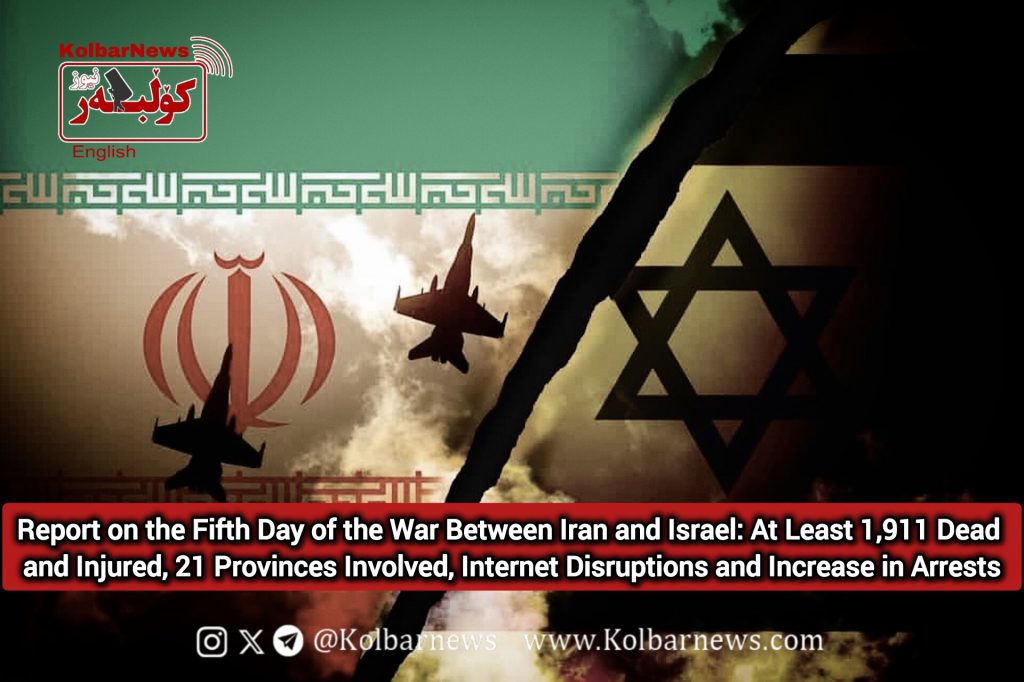On the fourth consecutive day of Israel’s extensive attacks on Iranian territory, the military and security dimensions of the crisis have intensified. As the death toll rises, the Iranian government has imposed severe internet restrictions and launched a new wave of security crackdowns.

According to Kolbarnews, in the early hours of Monday, June 16, 2025, Israeli attacks on military and civilian targets in Iran continued for the fourth straight day. Reports from non-governmental sources indicate that at least 452 people have been killed and 646 injured over the past four days. On Monday alone, 16 casualties were reported. Provinces affected by direct air and missile strikes include Tehran, Fars, Kermanshah, Kurdistan, Markazi, Khuzestan, East Azerbaijan, Zanjan, Qom, and Kerman.
The attacks have involved suicide drones, cruise missiles, rockets, and heavy bombers. In Tehran, key targets such as the IRIB building, oil refineries, emergency camps, and Mehrabad Airport were hit. Local observers report damage to civilian infrastructure, with several firefighters and journalists among the dead or wounded. In Kermanshah, IRGC missile depots and Farabi Hospital were struck, and powerful explosions were heard in residential neighborhoods.
Severe digital communication disruptions persist. The Islamic Republic has shut down or restricted internet access across multiple provinces. Many services relying on foreign platforms are inaccessible. WhatsApp remains blocked, and encrypted services like Signal and Telegram have been disrupted. These conditions have critically hampered citizen reporting, medical data transmission, and emergency coordination.
Alongside the ongoing external strikes, security agencies have launched a new wave of political and security arrests. On Monday alone, at least 15 people were detained in Tehran, North Khorasan, Ardabil, Kermanshah, Kerman, and Khuzestan. The main charges involve sharing information about the attacks, disseminating images, or commentary on social media. The total number of arrests in the past four days exceeds 115 individuals.
Also on Monday, Esmail Fekri, accused of “espionage for Israel,” was executed in Rajai Shahr Prison. Detained since December 2023, his death sentence was carried out following Supreme Court approval. His execution, amid ongoing conflict, is seen by observers as a harsh warning from Iranian security agencies to political suspects.
Iranian government officials have released conflicting casualty and damage figures in an apparent attempt to downplay the crisis. However, on-the-ground and hospital sources confirm that, for example, in the attack on Tehran’s Quds Square, 59 were injured and 12 killed, including a pregnant woman. The Ministry of Health has reported over 1,800 injured. Among the victims are several children and teenagers.
Rescue teams continue debris removal in severely damaged areas of Tehran, Tabriz, and Kermanshah, but shortages of equipment, medicine, and fuel have significantly slowed operations.
Human rights observers have raised serious concerns about mass violations of international humanitarian law, stating that indiscriminate attacks on residential areas, hospitals, media centers, and communication lines violate the principle of distinction between military and civilian targets. Reports suggest that some areas were targeted deliberately and without warning, and even rescue workers have been killed during operations. International organizations like the International Red Cross and Human Rights Watch have called for an immediate halt to the attacks, the creation of a humanitarian corridor, and guarantees for civilian protection.

